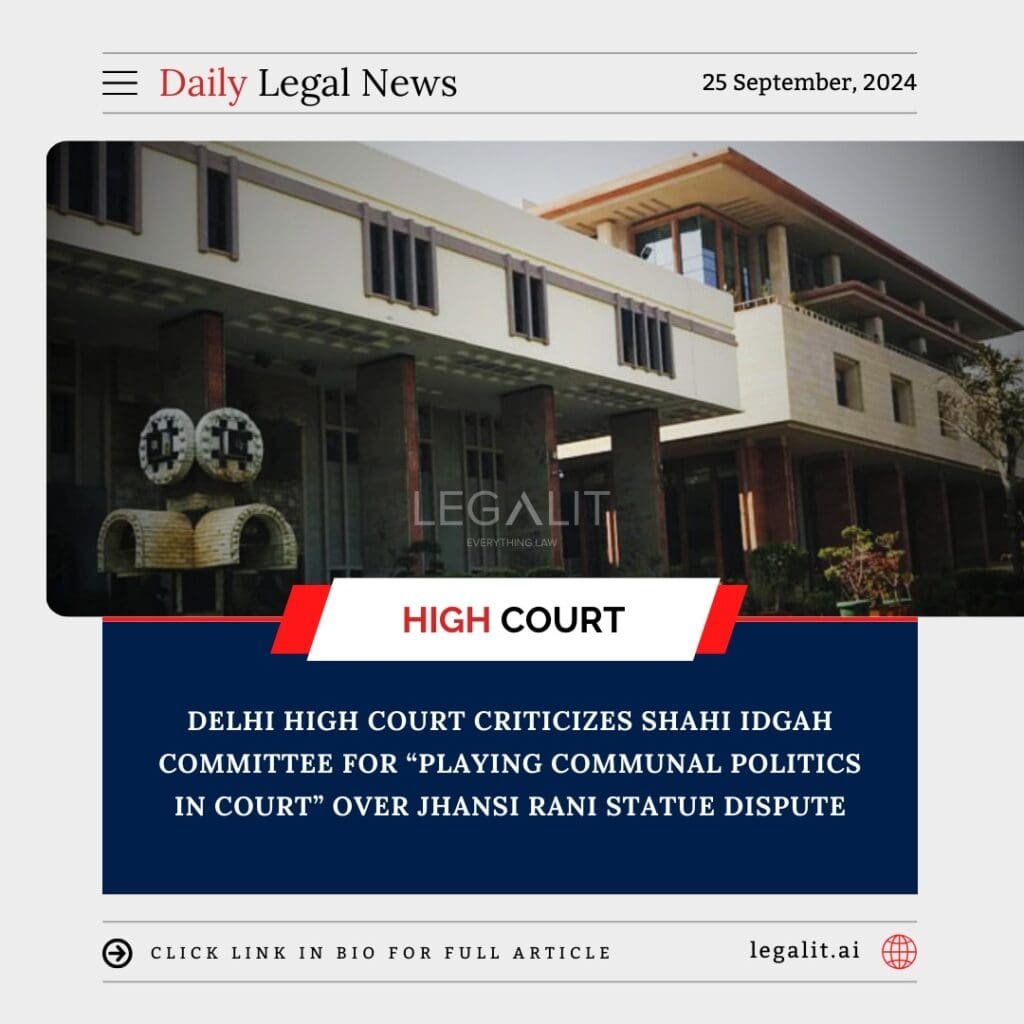
In a sharp rebuke, the Delhi High Court has condemned the Shahi Idgah committee for allegedly attempting to play communal politics during legal proceedings related to the installation of a statue of Jhansi Rani Lakshmi Bai at the Shahi Idgah park. The court expressed its displeasure over the tone and nature of the arguments presented by the committee, which appeared to shift the focus from legal merits to communal undertones.
1. The Case: Statue Installation Dispute
The controversy arose over a plan to install a statue of Jhansi Rani Lakshmi Bai within the Shahi Idgah park. The Shahi Idgah committee objected to the installation, citing concerns over the historical and religious significance of the site. The issue escalated when the committee’s legal representation allegedly introduced communal elements into their arguments, which did not sit well with the court.
The court had been asked to consider the legalities surrounding the proposed installation of the statue, but the proceedings took an unexpected turn when the committee began arguing the case on communal lines, rather than addressing the core legal and procedural concerns.
2. High Court’s Strong Disapproval
The Delhi High Court pulled up the committee for attempting to inject communal politics into a matter that should have been strictly a legal dispute. The court made it clear that it would not tolerate any attempts to polarize or communalize legal proceedings, emphasizing that the judiciary must remain focused on upholding the rule of law without being drawn into religious or communal arguments.
In its stern observation, the High Court noted that the committee’s approach was “not only inappropriate but also dangerous.” The bench remarked that courts are not forums for political or communal maneuvering and that the integrity of legal proceedings should be preserved from such divisive tactics.
3. Historical and Legal Context
The case centers around the installation of a statue of Jhansi Rani Lakshmi Bai, a revered figure in Indian history, known for her role in the Indian Rebellion of 1857. While the site at Shahi Idgah park holds religious significance for the Muslim community, the local authorities believed that the park was also a fitting location for a monument to Rani Lakshmi Bai due to her historical importance.
The Shahi Idgah committee argued against the installation, claiming it would disrupt the religious sanctity of the site. However, the court reminded both parties that the matter should be approached from a legal perspective, focusing on land use regulations, municipal approvals, and other procedural aspects, rather than inflaming communal sensitivities.
4. Court’s Emphasis on Judicial Neutrality
The High Court reiterated that courts must remain impartial and base their decisions solely on legal merits. By attempting to introduce communal politics into the case, the Shahi Idgah committee risked undermining the fairness and objectivity of the judicial process. The bench emphasized that all parties must respect the neutrality of the judiciary and refrain from turning the court into an arena for political posturing.
The court warned that any attempt to disrupt the peaceful coexistence of communities through the misuse of legal platforms would be dealt with severely. The rule of law, the court reminded, is above any religious or political affiliations and must be upheld at all times.
5. Potential Implications
This case is a strong reminder of the judiciary’s role in maintaining secularism and neutrality in India. As tensions between communities continue to rise in various parts of the country, the court’s condemnation of communal politics in legal disputes sends a clear message: justice must not be influenced by political or religious considerations.
The Delhi High Court’s intervention could also influence how religious disputes involving public spaces are handled in the future. It calls for a rational and legally sound approach to resolving such matters, free from polarizing rhetoric.
6. Looking Forward: Judicial Integrity
As the case proceeds, the Delhi High Court is expected to focus on the legal merits of the installation of the Rani Lakshmi Bai statue, addressing questions of land use, public interest, and heritage preservation. However, it has made it abundantly clear that any further attempts to communalize the issue will not be tolerated.
The court’s ruling could set an important precedent for how public spaces are shared and utilized, particularly in cases where there is a clash of historical, religious, or cultural significance. By emphasizing judicial impartiality, the Delhi High Court aims to ensure that such disputes are resolved based on constitutional principles rather than communal or political pressures.
The Delhi High Court’s strong rebuke of the Shahi Idgah committee serves as a reminder that legal matters should be approached with objectivity and respect for the judicial process, free from communal politics or divisive narratives.